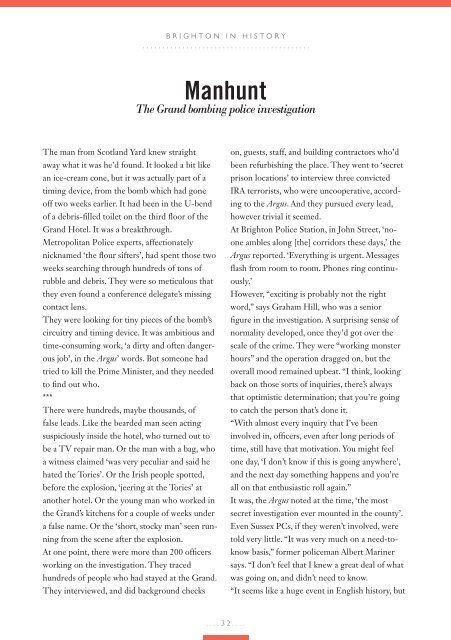Viva Brighton October 2015 Issue #32
- No tags were found...
Create successful ePaper yourself
Turn your PDF publications into a flip-book with our unique Google optimized e-Paper software.
BRIGHTON IN history<br />
..........................................<br />
Manhunt<br />
The Grand bombing police investigation<br />
The man from Scotland Yard knew straight<br />
away what it was he’d found. It looked a bit like<br />
an ice-cream cone, but it was actually part of a<br />
timing device, from the bomb which had gone<br />
off two weeks earlier. It had been in the U-bend<br />
of a debris-filled toilet on the third floor of the<br />
Grand Hotel. It was a breakthrough.<br />
Metropolitan Police experts, affectionately<br />
nicknamed ‘the flour sifters’, had spent those two<br />
weeks searching through hundreds of tons of<br />
rubble and debris. They were so meticulous that<br />
they even found a conference delegate’s missing<br />
contact lens.<br />
They were looking for tiny pieces of the bomb’s<br />
circuitry and timing device. It was ambitious and<br />
time-consuming work, ‘a dirty and often dangerous<br />
job’, in the Argus’ words. But someone had<br />
tried to kill the Prime Minister, and they needed<br />
to find out who.<br />
***<br />
There were hundreds, maybe thousands, of<br />
false leads. Like the bearded man seen acting<br />
suspiciously inside the hotel, who turned out to<br />
be a TV repair man. Or the man with a bag, who<br />
a witness claimed ‘was very peculiar and said he<br />
hated the Tories’. Or the Irish people spotted,<br />
before the explosion, ‘jeering at the Tories’ at<br />
another hotel. Or the young man who worked in<br />
the Grand’s kitchens for a couple of weeks under<br />
a false name. Or the ‘short, stocky man’ seen running<br />
from the scene after the explosion.<br />
At one point, there were more than 200 officers<br />
working on the investigation. They traced<br />
hundreds of people who had stayed at the Grand.<br />
They interviewed, and did background checks<br />
on, guests, staff, and building contractors who’d<br />
been refurbishing the place. They went to ‘secret<br />
prison locations’ to interview three convicted<br />
IRA terrorists, who were uncooperative, according<br />
to the Argus. And they pursued every lead,<br />
however trivial it seemed.<br />
At <strong>Brighton</strong> Police Station, in John Street, ‘noone<br />
ambles along [the] corridors these days,’ the<br />
Argus reported. ‘Everything is urgent. Messages<br />
flash from room to room. Phones ring continuously.’<br />
However, “exciting is probably not the right<br />
word,” says Graham Hill, who was a senior<br />
figure in the investigation. A surprising sense of<br />
normality developed, once they’d got over the<br />
scale of the crime. They were “working monster<br />
hours” and the operation dragged on, but the<br />
overall mood remained upbeat. “I think, looking<br />
back on those sorts of inquiries, there’s always<br />
that optimistic determination; that you’re going<br />
to catch the person that’s done it.<br />
“With almost every inquiry that I’ve been<br />
involved in, officers, even after long periods of<br />
time, still have that motivation. You might feel<br />
one day, ‘I don’t know if this is going anywhere’,<br />
and the next day something happens and you’re<br />
all on that enthusiastic roll again.”<br />
It was, the Argus noted at the time, ‘the most<br />
secret investigation ever mounted in the county’.<br />
Even Sussex PCs, if they weren’t involved, were<br />
told very little. “It was very much on a need-toknow<br />
basis,” former policeman Albert Mariner<br />
says. “I don’t feel that I knew a great deal of what<br />
was going on, and didn’t need to know.<br />
“It seems like a huge event in English history, but<br />
....32....


















